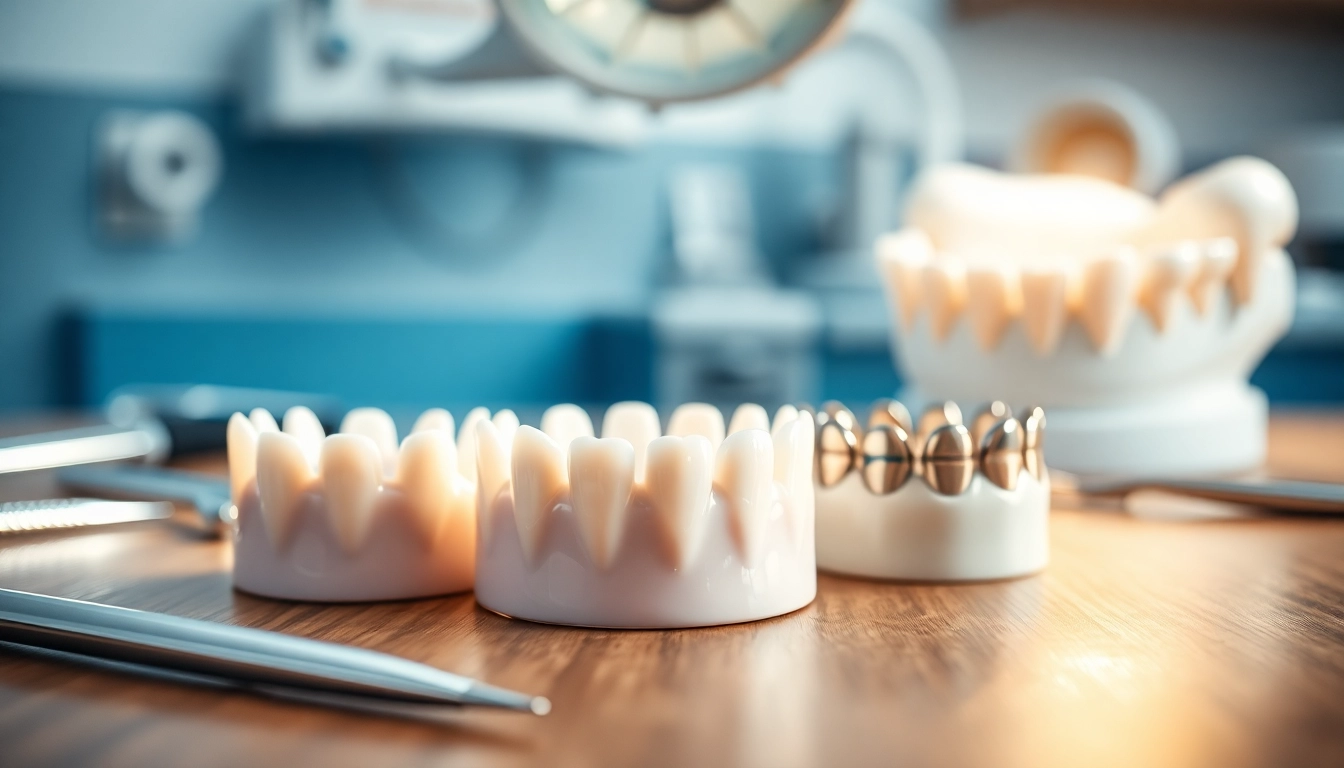
Understanding Dental Crowns: Types, Benefits, and Care Tips
What Are Dental Crowns?
Definition and Purpose of Crowns
A dental crown is a tooth-shaped cap that fits over a damaged or decayed tooth. Its primary purpose is to restore the tooth’s shape, size, strength, and improve its appearance. Crowns can also be utilized to cover dental implants or attach bridges, providing essential support and protection to affected teeth. By reinforcing compromised teeth, crowns help maintain oral health and functionality.
For those seeking more information on crowns, it’s important to note that crowns are figuratively designed to sit atop the existing tooth structure, enabling the tooth to function normally while ensuring aesthetic appeal.
Common Reasons for Getting Crowns
Patients may require crowns for a variety of reasons, including:
- To protect a weak tooth from breaking or to protect a fractured tooth.
- To restore an already broken tooth or a severely worn-down tooth.
- To cover and support a tooth with a large filling when there isn’t enough tooth remaining.
- To hold a dental bridge in place where one or more teeth are missing.
- To cover stained or discolored teeth for cosmetic enhancement.
How Crowns Affect Oral Health
The use of crowns plays a vital role in maintaining overall oral health. Properly fitted crowns can help preserve the remaining tooth structure, preventing further deterioration. They contribute to good bite alignment, ensuring that the forces exerted during chewing are evenly distributed.
Furthermore, crowns can help deter the risk of bacterial infections and decay that may arise from weakened or exposed teeth. In essence, crowns act as protective barriers that enhance the longevity of natural teeth while maintaining the aesthetic appearance of a patient’s smile.
Types of Crowns Available
Porcelain and Ceramic Crowns
Porcelain and ceramic crowns are renowned for their natural appearance and translucency, closely mimicking the look of natural teeth. These types offer excellent aesthetic results, making them an ideal choice for front teeth restoration. Porcelain crowns are also highly resistant to staining, making them suitable for long-term use. However, they can be more brittle compared to metal crowns, which may lead to a higher risk of breakage under significant pressure.
Metal Crowns: Pros and Cons
Metal crowns are made from a variety of materials, including gold, palladium, and nickel alloys. They are incredibly durable and can withstand significant chewing pressure, making them suitable for back teeth, where durability is of utmost importance. However, their metallic appearance is less appealing for front teeth, affecting aesthetic considerations.
Some advantages include:
- Exceptional strength and longevity.
- Fewer chances of chipping or breaking.
- Requires less tooth structure to be removed during placement.
On the downside, metal crowns can cause allergic reactions in some individuals and may lead to wear on adjacent teeth due to their hardness.
Composite Resin Crowns
Composite resin crowns are made from a plastic material colored to match the surrounding teeth. They are a more affordable alternative to porcelain crowns and can offer decent aesthetic results. However, composite crowns are less durable than porcelain and metal options and may be more susceptible to wear and staining over time.
Patients often choose composite resin crowns as a temporary solution while waiting for permanent restorations or when cost is an overriding concern. They can be an excellent choice for less visible teeth.
The Crown Procedure Explained
Initial Consultation and Preparation
The process of obtaining a crown begins with a comprehensive consultation with a dentist. This appointment involves examining the affected tooth and taking X-rays to assess the health of the tooth and surrounding bone. If the tooth is deemed a candidate for a crown, the dentist will initiate the treatment plan.
The preparation phase involves reshaping the tooth to accommodate the crown. This usually includes removing a portion of the tooth to ensure a proper fit for the crown. If a significant amount of the tooth structure is missing, the dentist may build up the tooth with filling material to provide more support.
The Crown Fitting Process
Following tooth preparation, the dentist will take impressions of the tooth and surrounding area. These impressions are crucial for designing the crown to ensure it fits perfectly within your bite and aligns with surrounding teeth.
In most cases, a temporary crown is placed while the permanent crown is being fabricated in a dental lab. This temporary crown protects the prepared tooth and maintains aesthetic appearance while waiting for the final restoration.
Once the custom crown is ready, the patient will return to the dental office for the fitting. The dentist will remove the temporary crown and place the permanent crown, making any necessary adjustments to ensure it fits comfortably and aligns with the rest of the teeth.
Aftercare for Dental Crowns
After receiving a crown, proper aftercare is crucial for ensuring the longevity of the restoration. Patients should maintain excellent oral hygiene by brushing twice a day and flossing daily, paying special attention around the crown margin. Regular dental check-ups are also essential to monitor the crown’s integrity and the health of the underlying tooth.
Initially, some sensitivity to hot or cold temperatures may be experienced, but this should dissipate over time. If sensitivity persists or if the crown feels loose, patients should consult their dentist promptly for evaluation.
Cost Factors Associated with Dental Crowns
Typical Cost Ranges for Different Types
The cost of dental crowns can vary widely based on several factors, including the type of crown selected, the dentist’s fees, and geographical location. Here are typical cost estimates for various crown types:
- Porcelain crowns: $800 – $3,000 per tooth.
- Porcelain-Fused-to-Metal crowns: $500 – $1,500 per tooth.
- Metal crowns: $600 – $2,500 per tooth.
- Composite crowns: $300 – $1,000 per tooth.
Patients should consult with their dentist to get an accurate estimate based on their individual circumstances and additional treatments they may need.
Insurance Coverage and Payment Options
Many dental insurance plans offer partial coverage for crowns, especially when they are deemed medically necessary. Coverage can vary significantly based on the plan, so patients are encouraged to review their policy details and discuss coverage options with their dental provider.
If insurance coverage is insufficient, many dental practices offer financing options or payment plans to help manage costs. Patients may also explore health care savings accounts (HSAs) or flexible spending accounts (FSAs) for tax-free savings to cover dental expenses.
Long-term Cost vs. Benefits
While the upfront cost of dental crowns may seem high, their long-term benefits should be considered. Crowns provide a durable solution that prolongs the life of the underlying tooth, ultimately saving patients from more extensive and costly procedures such as tooth extraction or implants in the future.
Moreover, crowns contribute to maintaining proper bite alignment, preventing adjacent teeth from shifting, which could lead to further complications and costs down the road. In essence, investing in high-quality crowns can be a cost-effective strategy for long-term dental health.
Maintaining Your Dental Crowns
Best Practices for Care and Maintenance
Maintaining dental crowns requires a commitment to regular oral hygiene practices to ensure their durability. The following tips can help in caring for your crowns:
- Brush your teeth at least twice a day using fluoride toothpaste.
- Floss daily, ensuring to clean around the margins of the crown.
- Use an antimicrobial mouthwash to help reduce plaque buildup.
- Avoid hard or sticky foods that may damage the crown or dislodge it.
Signs Your Crown Needs Attention
Patients should be vigilant and watch for specific indicators that suggest the need for professional evaluation:
- Persistent sensitivity to temperature changes.
- Visible damage or cracks in the crown material.
- Loose crown or changes in how the crown fits against neighboring teeth.
- Discoloration around the crown margin, indicating potential decay or gum issues.
Regular Check-ups: Why They Matter
Regular dental check-ups are critical for monitoring the health of crowns and the surrounding teeth. During these visits, dentists can assess the condition of the crowns, perform necessary cleanings, and address any emerging issues before they escalate into more serious problems.
Moreover, consistent appointments ensure that patients receive tailored recommendations on oral hygiene practices and any adjustments needed to maintain optimal dental health. These proactive measures contribute to the longevity of dental crowns and overall oral health.



